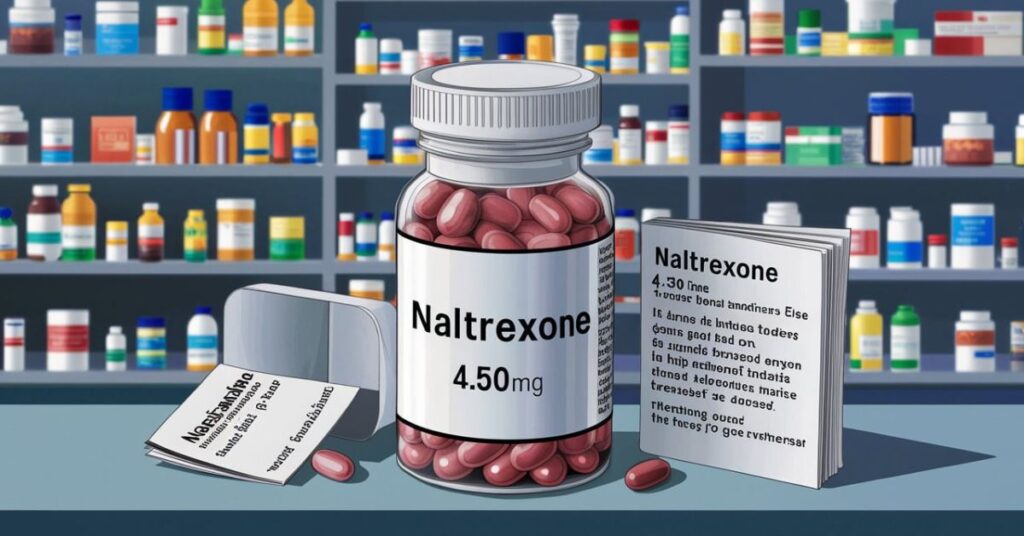Understanding Naltrexone 4.50mg Extremely Tired

Naltrexone is a medication widely used for managing opioid and alcohol dependence. Its effectiveness in blocking opioid effects and reducing cravings has made it a crucial part of addiction treatment. However, some individuals experience extreme tiredness when they start taking naltrexone, particularly at a dosage of 4.50mg. This article delves into the reasons behind this extreme tiredness, how to manage it, and what steps to take if you encounter this side effect.
What is Naltrexone 4.50mg?
Naltrexone is an opioid antagonist, meaning it blocks the effects of opioids on the brain. This action helps in preventing relapse in individuals recovering from opioid or alcohol dependence. The medication can come in various dosages, including 4.50mg, which is used for specific therapeutic purposes. This dosage is particularly potent, and its impact on the body can vary from person to person.
Why Does Naltrexone 4.50mg Cause Extreme Tiredness?
Experiencing extreme tiredness while on naltrexone 4.50mg can be attributed to several interconnected factors:
- Neurotransmitter Disruption: Naltrexone affects neurotransmitters in the brain, which are responsible for regulating mood, energy levels, and alertness. By blocking opioid receptors, naltrexone alters the usual chemical balance in the brain, leading to changes in how alert or energetic you feel. This disruption can result in feelings of extreme tiredness as your brain adjusts to the medication.
- Initial Adjustment Period: When you start taking naltrexone, your body undergoes a period of adjustment. This adjustment phase can lead to side effects such as extreme tiredness. Your body is adapting to the medication’s presence, and this transitional period can cause temporary fatigue as a common side effect.
- Dosage Sensitivity: The 4.50mg dosage of naltrexone is higher than some individuals might be used to. Higher dosages can amplify side effects, including extreme tiredness. Your body’s sensitivity to the dosage level can play a significant role in how you experience these side effects.
- Medication Interactions: If you are taking other medications alongside naltrexone, interactions between these drugs can exacerbate feelings of extreme tiredness. Some medications can enhance the sedative effects of naltrexone or contribute to fatigue. It’s essential to review all your medications with your healthcare provider to avoid negative interactions.
- Underlying Health Conditions: Pre-existing health conditions can influence how you experience side effects from naltrexone. For example, individuals with chronic fatigue syndrome or similar conditions may find that naltrexone worsens their existing fatigue. It’s important to consider these underlying factors when assessing the cause of extreme tiredness.
How to Manage Extreme Tiredness with Naltrexone 4.50mg
If you are experiencing extreme tiredness while taking naltrexone 4.50mg, consider the following strategies to manage and mitigate this side effect:
- Gradual Dosage Adjustment: Starting with a lower dose of naltrexone and gradually increasing it can help your body adjust more smoothly. This gradual approach might reduce the severity of fatigue. Consult your healthcare provider about whether a gradual dosage adjustment is appropriate for you.
- Healthy Lifestyle Choices: Adopting a healthy lifestyle can have a significant impact on your energy levels. Eating a balanced diet, engaging in regular physical activity, and ensuring you get adequate sleep can help counteract feelings of extreme tiredness. Even small changes in your daily routine can enhance your overall well-being and energy levels.
- Stay Hydrated: Dehydration can contribute to feelings of tiredness. Make sure you are drinking enough water throughout the day to stay hydrated. Proper hydration supports overall health and can help combat fatigue.
- Monitor and Report Symptoms: Keeping track of your symptoms and discussing them with your healthcare provider is crucial. Detailed information about your energy levels and any other side effects can help your provider assess whether any adjustments to your treatment plan are needed.
- Avoid Alcohol and Depressants: Alcohol and other depressants can worsen feelings of fatigue. It’s advisable to avoid these substances while taking naltrexone. They can interfere with the medication’s effectiveness and exacerbate side effects.
- Incorporate Relaxation Techniques: Relaxation techniques such as meditation, deep breathing exercises, or yoga can help manage stress and improve your overall sense of well-being. Reducing stress can positively impact your energy levels and help with feelings of extreme tiredness.
- Regular Physical Activity: Engage in light to moderate exercise regularly. Physical activity can boost your energy levels and improve your mood. Activities like walking, swimming, or cycling can help alleviate some of the tiredness you may be experiencing.
- Structured Sleep Routine: Establishing a consistent sleep routine can improve the quality of your rest. Aim for 7-9 hours of sleep each night and maintain a regular sleep schedule to support better energy levels during the day.
When to Seek Medical Advice
If extreme tiredness persists or significantly impacts your daily life, it’s essential to consult your healthcare provider. They can help determine if the fatigue is a normal side effect or if there might be another underlying issue that needs to be addressed. Your provider can evaluate whether naltrexone 4.50mg is the right treatment for you or if adjustments to your medication or dosage are necessary.
Related FAQs
Q: Is extreme tiredness a common side effect of naltrexone 4.50mg?
A: Yes, extreme tiredness can be a common side effect when starting naltrexone, particularly at a higher dosage like 4.50mg. This fatigue often results from the body’s adjustment to the medication.
Q: How long does extreme tiredness last after starting naltrexone 4.50mg?
A: The duration of extreme tiredness varies from person to person. For many, fatigue decreases as the body adjusts to the medication. This adjustment period can last from a few weeks to a couple of months.
Q: Can I take other medications to reduce fatigue from naltrexone 4.50mg?
A: It’s important to discuss any additional medications with your healthcare provider to avoid interactions that might worsen fatigue or create new issues. Your provider can suggest appropriate solutions based on your individual needs.
Q: What should I do if extreme tiredness from naltrexone 4.50mg becomes severe?
A: If extreme tiredness becomes severe or interferes significantly with your daily life, contact your healthcare provider. They can evaluate your symptoms and provide guidance on how to manage them or consider alternative treatments.
Q: Are there alternative treatments if naltrexone 4.50mg causes significant fatigue?
A: Yes, there may be alternative treatments available. If naltrexone 4.50mg proves to be too problematic, your healthcare provider can discuss other medication options or treatment strategies that might better suit your needs.
Conclusion
Extreme tiredness associated with naltrexone 4.50mg can be a challenging side effect, but understanding the reasons behind it and implementing effective management strategies can help you cope more effectively. By working closely with your healthcare provider, making necessary lifestyle adjustments, and monitoring your symptoms, you can address this side effect and continue your treatment with greater comfort and efficacy. Your well-being and quality of life are paramount, and with the right approach, you can navigate the challenges of naltrexone treatment successfully.








